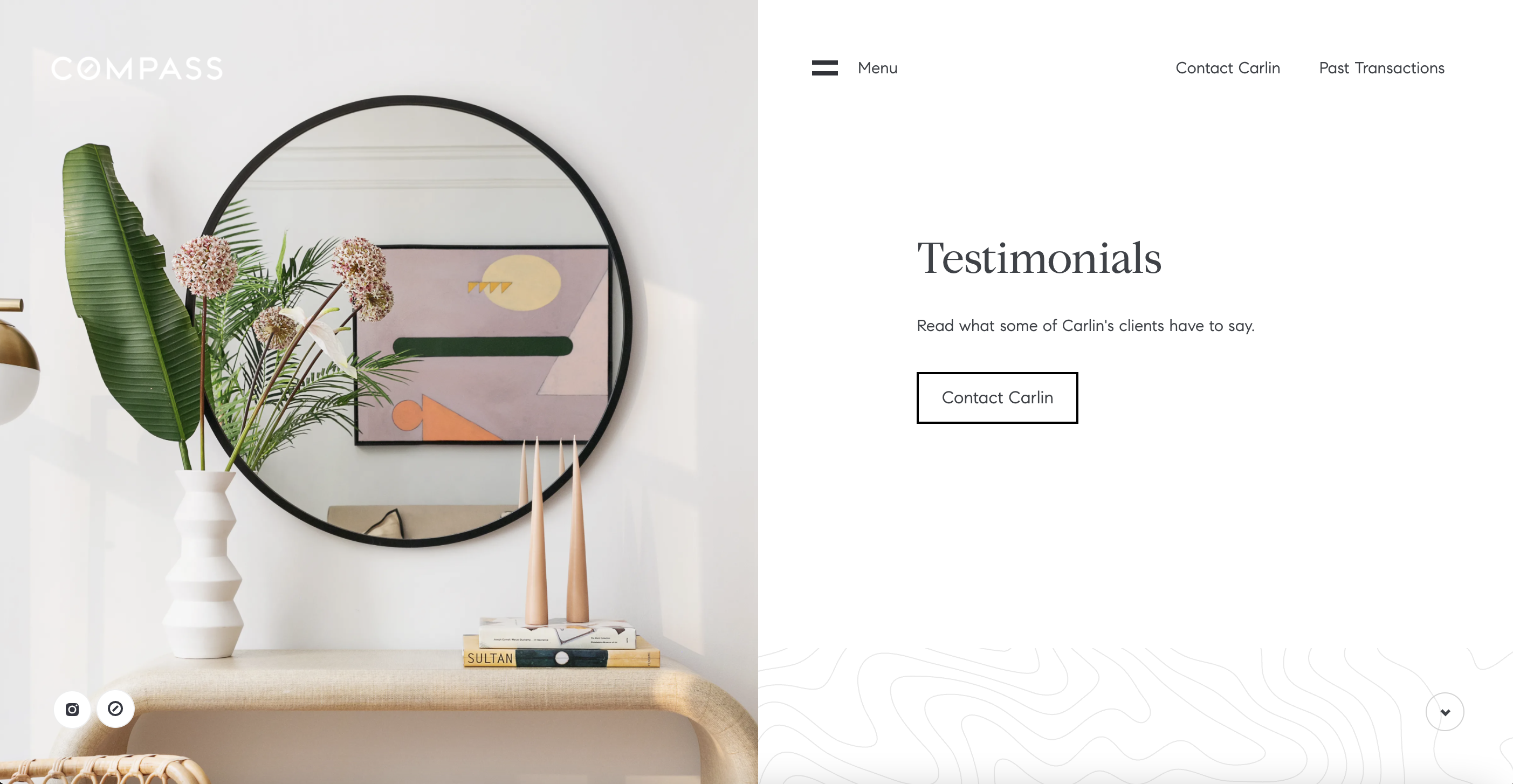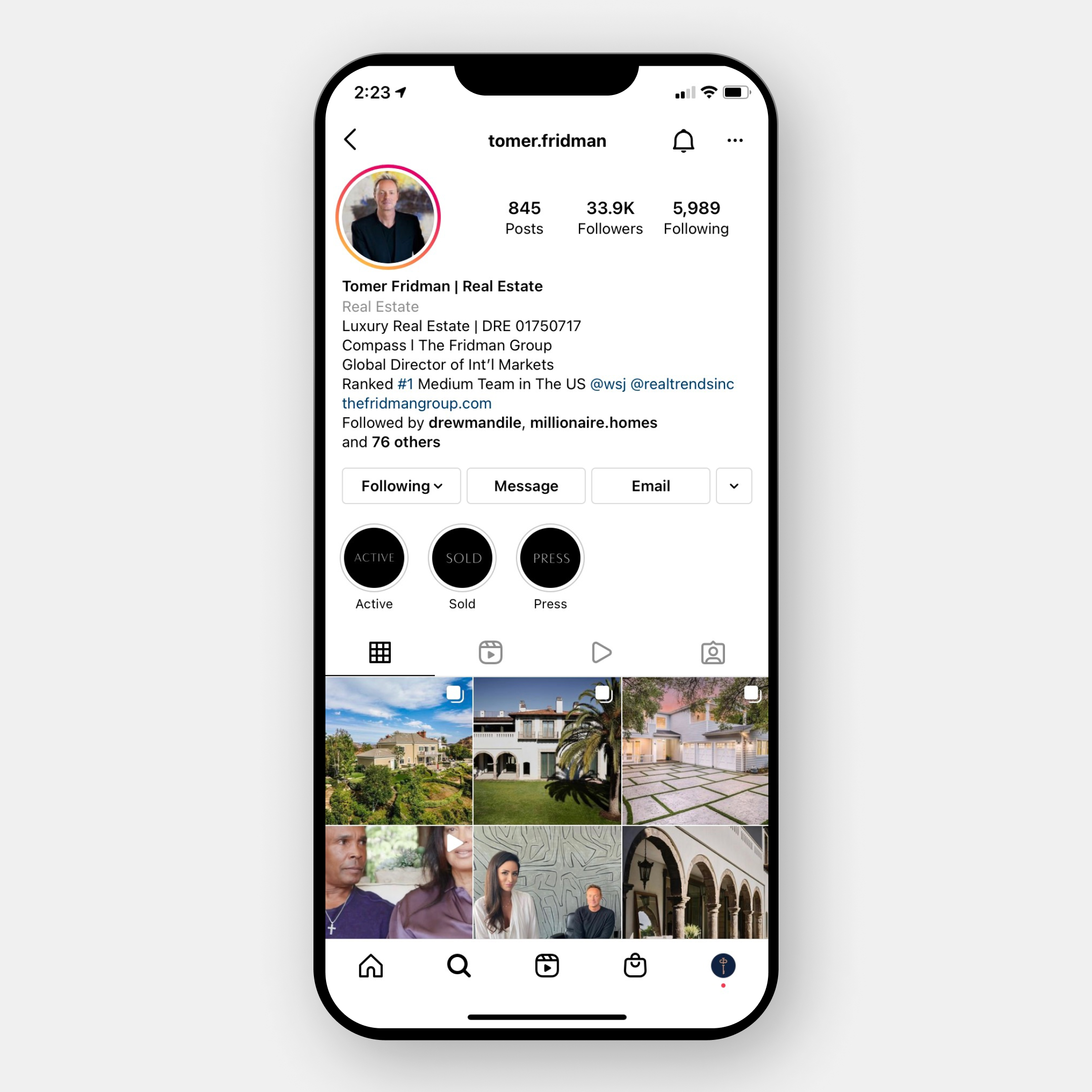The #1 Trust Killer: Why Congruence
Among Your Social Channels is So
Important
SEPTEMBER 13, 2021
How to keep your social media presence consistent to build your business.
Social media is one of the best marketing tools for the modern real estate professional. However, using social media incorrectly is also one of the best ways to kill trust in your target market and ensure they will gravitate toward your competition when they are ready to make a decision. To avoid that, you need to have congruence among your channels and use social media effectively. Here’s how.
Why Congruence Leads to Trust
When a home buyer or seller researches realtors they are considering working with, they want to know what to expect. Do you specialize in the type, price, and location of the home they want to buy or sell? Do you tend to work with clients who match their age, income level, and other demographics? Will you use language that makes sense to them and makes them feel comfortable? All these questions and many more will be going through their minds when they look at your social media channels.
If a potential client sees that you are consistent throughout the channels, they can start to get to know you. Soon, they will feel comfortable with the thought of working with you and will feel confident in taking the next step to contact you.
Now imagine that potential client sees you using complicated language and talking about high-end investment properties on LinkedIn, but then being more casual and targeting first-time home-buyers on Facebook. They’ll likely wonder which is the true person. They may want to work with the person you portray on Facebook, but would feel very uncomfortable talking with the one you portray on LinkedIn. Eventually, this will lead to confusion and cause them to seek out an agent who has a more consistent reputation.
How to keep your social media presence
consistent to build your business.

Database Marketing Strategies
The Importance of Your Website as a Realtor
Social media is one of the best marketing tools for the modern real estate
professional. However, using social media incorrectly is also one of the best
ways to kill trust in your target market and ensure they will gravitate toward
your competition when they are ready to make a decision. To avoid that, you
need to have congruence among your channels and use social media
effectively. Here’s how.
Why Congruence Leads to Trust
When a home buyer or seller researches realtors they are considering working with,
they want to know what to expect. Do you specialize in the type, price, and location
of the home they want to buy or sell? Do you tend to work with clients who match
their age, income level, and other demographics? Will you use language that makes
sense to them and makes them feel comfortable? All these questions and many more
will be going through their minds when they look at your social media channels.
If a potential client sees that you are consistent throughout the channels, they can start
to get to know you. Soon, they will feel comfortable with the thought of working with
you and will feel confident in taking the next step to contact you.
Now imagine that potential client sees you using complicated language and talking about
high-end investment properties on LinkedIn, but then being more casual and targeting
first-time home-buyers on Facebook. They’ll likely wonder which is the true person.
They may want to work with the person you portray on Facebook, but would feel
very uncomfortable talking with the one you portray on LinkedIn. Eventually, this
will lead to confusion and cause them to seek out an agent who has a more
consistent reputation.
Mistakes That Lead to Lack of Congruence
A congruence among social channels shows your potential clients and referral partners that you are professional, have kept up with the changes in the market, and that you have a solid, consistent brand. Unfortunately, many agents make a number of possible mistakes that lead to lack of congruence and kills trust. They include:
■ Having multiple people post to their social media accounts.
Do you have your assistant handle your Twitter account while your daughter posts to LinkedIn and you post to Facebook? This is a common scenario with solo agents who try to do everything on their own and randomly delegate tasks they don’t have time for. When you have multiple people post to your accounts, your voice and message are not consistent and you can’t build trust.
■ You don’t know your voice.
If you have not established your ideal client, how they want to be talked to, and how what you specialize in can help solve their problems, you have not created your marketing voice and won’t be able to use it consistently on social media (or anywhere else).
■ You haven’t created a reputation style guide.
Once you know your voice, you have to be able to put it into words and understand how it should be communicated. This can then be shared with others on your team and your referral partners so you can achieve consistency.
■ You don’t have a posting schedule or strategy.
If you haven’t established a social media marketing strategy and schedule your posts, you’re likely posting whenever you get a chance without much forethought about what you’ll post. This leads to inconsistency and poorly constructed posts that do nothing to build your reputation or trust among your potential clients.
■ You don’t fill out your profiles with consistent information.
When some agents create their various social media profiles, they don’t spend a lot of time filling them out and ensuring they are consistent with the information they have on other channels, their websites, and their other marketing materials. This leads to confusion when a potential client researches you and finds discrepancies in your information.
■ You put only listings on one platform and educational information on another.
Think that Facebook is only a place to promote listings while LinkedIn is the place for educational articles or infographics? You’re wrong. Each platform should have roughly the same percentage of educational or informational posts and listings, with an emphasis on the first.

The Wrong Messaging
Build and Market to Your Database
As a realtor, your database is your best friend. This is your list of past, current, and prospective clients as well as referral sources who can help grow your business. A basic rule of thumb is that an effective database consists of around 1000 names and contact information. Once you’ve built a solid database, you can market to your contacts through regular email newsletters, texts, or personal invitations to events or open houses. The marketing you do to your database should follow the same guidelines as your social media marketing: keep content informational and helpful rather than salesy. This keeps your contacts engaged with your brand and ensures they will continue to pay attention to what you have to say even when they are not actively looking to buy or sell real estate.
Harness the Power of Social Proof
The theory of social proof states that people are likely to conform and copy the actions of those in their peer group or those they view as experts or who are trustworthy. When it comes to real estate marketing, you can take advantage of social proof by featuring testimonials on your site and social media, soliciting online reviews from those you’ve done business with, and by establishing yourself as an authority on the local real estate market with helpful, informative content. When you harness the power of social proof, you essentially have others selling for you and no longer have to hustle or chase leads.

Database Marketing Strategies

The Right Messaging
Mistakes That Lead to Lack of Congruence
A congruence among social channels shows your potential clients and referral
partners that you are professional, have kept up with the changes in the market,
and that you have a solid, consistent brand. Unfortunately, many agents make a
number of possible mistakes that lead to lack of congruence and kills trust.
They include:
■ Having multiple people post to their social media accounts.
Do you have your assistant handle your Twitter account while your daughter
posts to LinkedIn and you post to Facebook? This is a common scenario with
solo agents who try to do everything on their own and randomly delegate tasks
they don’t have time for. When you have multiple people post to your accounts,
your voice and message are not consistent and you can’t build trust.
■ You don’t know your voice.
If you have not established your ideal client, how they want to be talked to, and
how what you specialize in can help solve their problems, you have not created
your marketing voice and won’t be able to use it consistently on social media
(or anywhere else).
■ You haven’t created a reputation style guide.
Once you know your voice, you have to be able to put it into words and understand
how it should be communicated. This can then be shared with others on your team
and your referral partners so you can achieve consistency.
■ You don’t have a posting schedule or strategy.
If you haven’t established a social media marketing strategy and schedule your posts,
you’re likely posting whenever you get a chance without much forethought about
what you’ll post. This leads to inconsistency and poorly constructed posts that do
nothing to build your reputation or trust among your potential clients.
■ You don’t fill out your profiles with consistent information.
When some agents create their various social media profiles, they don’t spend a
lot of time filling them out and ensuring they are consistent with the information
they have on other channels, their websites, and their other marketing materials.
This leads to confusion when a potential client researches you and finds
discrepancies in your information.
■ You put only listings on one platform and educational information on another.
Think that Facebook is only a place to promote listings while LinkedIn is the
place for educational articles or infographics? You’re wrong. Each platform
should have roughly the same percentage of educational or informational
posts and listings, with an emphasis on the first.
Now that you understand that talking yourself and your accomplishments up on your site is the wrong messaging, let’s take a look at the content that works. Here are some tips on creating messaging that resonates with your target audience:
Content that is helpful. What are the issues your ideal client is dealing with? Are they attempting to buy and sell homes at the same time and need assistance with financing a down payment? Are they struggling to find a home they are interested in due to low inventory? Are they trying to decide if they should relocate or buy a second home now that they are empty-nesters? Identify the pain points in your target market, then address those points through blog posts that you then share on social media and in newsletters that go out to your database.
Content that establishes you as an expert. Those looking for help buying or selling property want to work with the best. To show that you are an expert in your local community and industry, develop content that revolves around neighborhood events, local real estate news, and other industry issues.
Content from experts and past clients. When you use the power of social proof to develop your website content, you let others do the selling for you. Social proof is the phenomenon where others copy the actions of people they see as peers or as trusted individuals. If they see your past clients talking about your high level of customer service in a video testimonial or read reviews from experts in the industry who have worked with you, they will be more likely to choose you as their realtor.
Content that stays ahead of the game. Your ideal client wants to know what’s going on in the industry as soon as possible. They also don’t want to read the same old content on your site that they’ve read on all your competitors’ sites. To address these needs, stay on the cutting edge of the industry and share information your visitors can’t get anywhere else.

Components of an Effective Lead
Generation System


How the Right Messaging Increases Conversions
How to Create Congruence on Social Channels
Starting to see how important congruence among your social channels is (and how easy it is to create confusion and erode trust)? Use the following tips to ensure your online reputation and consistency and is one that builds trust.
■ Designate one person (or company) to post to all your channels. It’s likely you cannot keep up with a social media posting schedule in addition to your full-time job of buying and selling homes. That’s why it’s better to hand over this job to a pro, whether that’s an in-house marketing specialist or an outside company who can handle it for you.
■ Establish a consistent branding voice and style guide.
■ Use similar professional images for your profile picture and background images.
■ Schedule your posts so you stay consistent.
■ Engage with followers on all platforms in the same voice. Social media is meant to be social, and your goal is to have followers comment on and share your posts. Make sure you always respond to questions or comments and do so in a consistent manner.
■ Blend your listings and salesy posts with plenty of posts that are information, educational, or humorous. Your followers want to know they can trust you as a resource and that you won’t just try to sell them on your services.
■ Have consistent contact information. Your ultimate goal is for your social media followers to reach out to you for more information or to schedule a meeting. Make sure that’s easy for them. Have an email address or phone number that you check frequently and use it on all platforms.
Need some assistance creating and managing congruent social media channels? Reach out to the expert marketers at Luxury Presence for guidance. We’d love to help you build trust and take your agency to the next level.
How to Create Congruence on Social Channels
Starting to see how important congruence among your social channels is
(and how easy it is to create confusion and erode trust)? Use the following
tips to ensure your online reputation and consistency and is one that builds
trust.
■ Designate one person (or company) to post to all your channels. It’s likely you
cannot keep up with a social media posting schedule in addition to your full-time
job of buying and selling homes. That’s why it’s better to hand over this job to a pro,
whether that’s an in-house marketing specialist or an outside company who can
handle it for you.
■ Establish a consistent branding voice and style guide.
■ Use similar professional images for your profile picture and background images.
■ Schedule your posts so you stay consistent.
■ Engage with followers on all platforms in the same voice. Social media is meant
to be social, and your goal is to have followers comment on and share your posts.
Make sure you always respond to questions or comments and do so in a consistent
manner.
■ Blend your listings and salesy posts with plenty of posts that are information,
educational, or humorous. Your followers want to know they can trust you as a
resource and that you won’t just try to sell them on your services.
■ Have consistent contact information. Your ultimate goal is for your social media
followers to reach out to you for more information or to schedule a meeting. Make
sure that’s easy for them. Have an email address or phone number that you check
frequently and use it on all platforms.
Need some assistance creating and managing congruent social media channels?
Reach out to the expert marketers at Luxury Presence for guidance. We’d love to
help you build trust and take your agency to the next level.
LATEST POST
Learn the latest marketing and tech trends from our
marketing gurus and contributing industry experts.

NOVEMBER 30, 2021
HOW TO SET UP A TESTIMONIAL-GENERATION SYSTEM IN YOUR BUSINESS

NOVEMBER 16, 2021
6 WAYS YOU CAN DEMONSTRATE YOUR EXPERTISE WITH SOCIAL MEDIA

FOR THE 2ND YEAR IN A ROW, LUXURY PRESENCE RANKS NO. 598 ON THE 2021 INC. 5000
NOVEMBER 11, 2021
THE POWER OF FORMING STRATEGIC PARTNERSHIPS WITH REFERRAL PARTNERS


